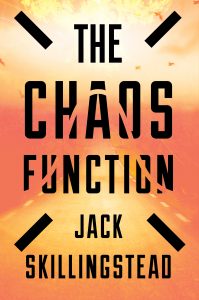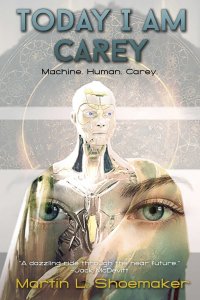Russell Letson Reviews The Chaos Function by Jack Skillingstead
 The Chaos Function, Jack Skillingstead (John Joseph Adams 978-1-328-52615-1, $24.00, 294pp, hc) March 2019.
The Chaos Function, Jack Skillingstead (John Joseph Adams 978-1-328-52615-1, $24.00, 294pp, hc) March 2019.
Jack Skillingstead’s The Chaos Function invites us to think about the tangle of paths that lead into or away from any given Bad Place, and how hard it is to avoid going down them. It is set ten years from now in a world that differs from the present mainly in improvements in smartphone technology. The Syrian civil war is technically over, and Aleppo (or what’s left of it) remains a dangerous place, but such places draw journalist Olivia Nikitas. Distanced from her family, keeping even lovers at arm’s length, she is most at home covering “the capital D that was the world Disaster that never stopped, that was always right here, under the surface.” In Aleppo, she and current boyfriend Brian are caught in a firefight, and Brian both dies and survives, because something enters Olivia’s mind and gives her the power to change the outcome of the situation. But the consequences that unfurl from that one change unleash a plague that threatens the whole world.
This information is revealed in the jacket copy and is thus not a spoiler: Olivia has become the carrier of a device that connects her to a “probability machine” that allows her to see and change the crisis points that govern event paths. But the device and the machine to which it connects have long been at the heart of a cult-like Society, which wants to recover the device and the power it wields. The book’s armature, then, is a chase adventure in which Olivia is both pursued (by the Society) and pursuer, as she tries to master the power of the machine and find its physical location.
Since this book is a thriller as well as a science-fictional riddle, spoiler avoidance is required in order to preserve the pleasures of those forms, and the details of Olivia’s pursued/pursuer adventures – the particular twists, turns, and drops of the ride – must remain behind the Curtain. Experienced readers will not be surprised to see how messing with crisis points can produce unforeseen effects as the probability machine of history grinds along, producing cascades of unintended and undesirable consequences, and Olivia discovers that all roads lead to, if not Samarra, at least Aleppo. The path to that recognition and the inevitable showdown runs through some rough territory, each tweak and change producing increasingly dire scenarios and desperate corrective measures before a grim stability is reached.
There are, however, matters that can be safely discussed. As with Elizabeth Bear’s Ancient Night (reviewed a few months back), I wondered about the attention given to introspection and emotional back-story: Olivia’s prickliness, her strained relationship with her stepmother, and even her somewhat reluctant love for Brian. (“What’s the first rule of relationship club? Don’t let the salesman through the door.”) Some of this, of course, is the character design that explains her choice of profession – the peripatetic observer, forever chasing the stories of other people’s miseries. But as in Ancient Night, these details are also thematic. There is in Olivia a push-pull of connection to and distance from the world and its suffering, and it finally collapses into commitment and action when she unwittingly changes the world to save Brian and then keeps trying to find a fix that still saves him and the others she encounters, as the probability machine generates its increasingly destructive outcomes. Her exertions take her from one side of the world to the other and back again, but her internal journey moves the novel away from a mere thrill-ride – though even the toughest connoisseur of rollercoasters will not be disappointed by the scary bits.
Russell Letson, Contributing Editor, is a not-quite-retired freelance writer living in St. Cloud, Minnesota. He has been loitering around the SF world since childhood and been writing about it since his long-ago grad school days. In between, he published a good bit of business-technology and music journalism. He is still working on a book about Hawaiian slack key guitar.
This review and more like it in the May 2019 issue of Locus.
 While you are here, please take a moment to support Locus with a one-time or recurring donation. We rely on reader donations to keep the magazine and site going, and would like to keep the site paywall free, but WE NEED YOUR FINANCIAL SUPPORT to continue quality coverage of the science fiction and fantasy field.
While you are here, please take a moment to support Locus with a one-time or recurring donation. We rely on reader donations to keep the magazine and site going, and would like to keep the site paywall free, but WE NEED YOUR FINANCIAL SUPPORT to continue quality coverage of the science fiction and fantasy field.







